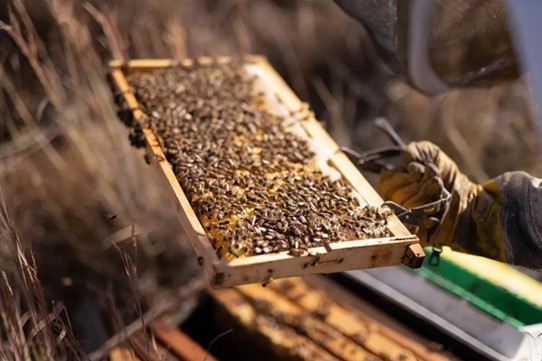Top-quality queen bees for top-quality honey
29 May 2023
Paschalis Harzanis, Professor Emeritus at the Agricultural University of Athens
 The 'Melissa Zoi' Centre for the Artificial Reproduction of Queen Bees was established and is operating at the village of Odou, on the initiative of Bank of Cyprus and the Cyprus Rotary Clubs. The centre supports environmental revitalisation as well as economic recovery and professional activity in honey-producing areas damaged by fires. It provides young people living in the countryside with the opportunities and means to continue engaging professionally in the production of honey and other products.
The 'Melissa Zoi' Centre for the Artificial Reproduction of Queen Bees was established and is operating at the village of Odou, on the initiative of Bank of Cyprus and the Cyprus Rotary Clubs. The centre supports environmental revitalisation as well as economic recovery and professional activity in honey-producing areas damaged by fires. It provides young people living in the countryside with the opportunities and means to continue engaging professionally in the production of honey and other products.
Professor Harzanis visited Cyprus where during a training programme held at the centre he gave a presentation on issues relating to the production of queen bees via artificial insemination and on the importance of better-quality queen bees in honey production.
Top-quality queen bees
Professor, please explain artificial insemination in layman's terms, and tell us how important it is for the production of high-quality honey.
Artificial insemination is a necessary tool in bee research and in improving the genetic stock. Progress in techniques, as well as in new equipment design in conjunction with growing knowledge about bees have made this practice highly successful.
How does artificial insemination help beekeepers?
Artificial insemination allows us to produce top-quality queen bees with the desired traits for our region, and it ensures total control over breeding. It allows us to engage in breeding that could not otherwise occur in nature. When done correctly, the process will produce Breeder Queens, which through the method of queen breeding yields mass production of queen bees. With artificial insemination, we do not perform mass production of fertilised queens.
How has the introduction of non-native genera of bees affected the Cyprus bee?
The Cyprus bee has survived here for thousands of years, providing food for people but also pollinating the ecosystem. It has faced harsh weather conditions, predators and disease, dealing with it all successfully as it highly adaptable.
In recent years, the introduction of bees not native to Cyprus has altered the genetic mix, allowing predators and diseases to come in. So the purebred bee, which had easily dealt with all those challenges and had high honey yields in traditional hives, was likewise altered. Modern-day apiaries feature two-storey and three-storey hives with very high honey production.
Disastrous consequences
What problems has the introduction of non-native bees caused in Cyprus?
The introduction of foreign pathogens has had disastrous consequences because, in order to deal with this, you need to use medicines in the hive, and as a result residues accumulate in the honey being produced, which downgrades its quality.
Non-native bees are not adapted to Cyprus' hot and dry climate, they cannot deal with wasps. As a result, entire beehives collapse and honey production is wiped out. Native bees will yield more, and better honey, with less medicine.
Some are calling for a ban on importing queen bees, they want to protect and improve native genera as is the case in other EU member states where steps are being taken to protect local bee populations, such as in Austria, Belgium, Poland, Slovenia, Spain and England.
The 'Melissa Zoi' Centre provides new momentum, given that artificial insemination speeds up reproduction, improves the genetic stock and protects the Cyprus bee. What is your opinion of the centre?
A facility that utilises new techniques - such as artificial insemination, queen breeding, special beekeeping operations, honey analysis and so forth - will help produce improved Cyprus queen bees, and distribute them to beekeepers so that they can sustain strong hives adapted to the tough weather conditions here. The centre monitors the quality of the honey, allowing it to compete with other non-native honey produced both in Cyprus and abroad. It's a very good start, and an example to follow.
